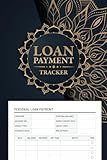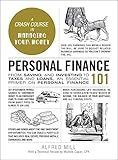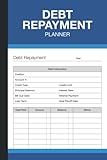Best Personal Loans for Beginners to Buy in November 2025

Personal Loan Payment Tracker: Debt Payoff Planner to Manage and Track Your for Financial Success



Personal Finance 101: From Saving and Investing to Taxes and Loans, an Essential Primer on Personal Finance (Adams 101 Series)



Personal Finance in Your 20s & 30s For Dummies (For Dummies (Business & Personal Finance))



The Insider’s Guide to Business Credit Using an EIN Only: Get Tradelines, Credit Cards, and Loans for Your Business with No Personal Guarantee



Personal Loan Agreement Forms Book: Standard Legal Contract of Understanding For Credit Repayment - Promissory Note



Debt Repayment Planner: Log Book Tracker For Credit and Loan Payoff - Personal Budgeting - (100 Pages) - 6x9 Inches


If you are a first-time borrower and need a personal loan, there are several options available to you. Here are some places where you can explore obtaining a personal loan:
- Traditional Banks: You can approach your local bank or credit union to inquire about personal loan options for first-time borrowers. They will assess your eligibility based on factors such as credit score, income, and employment history.
- Online Lenders: Numerous online lenders specialize in offering personal loans to individuals, including first-time borrowers. These lenders often have a streamlined application process and may consider other factors beyond credit history in determining loan approval.
- Peer-to-Peer Lending Platforms: Peer-to-peer lending platforms connect borrowers with individual lenders or investors. These platforms often provide personal loans with competitive interest rates, and they may be more flexible in evaluating your creditworthiness compared to traditional lenders.
- Credit Unions: Consider joining a credit union if you are not already a member. Credit unions are nonprofit financial organizations that often provide lower interest rates on personal loans and may be more willing to lend to first-time borrowers.
- Friends and Family: Depending on your relationship with them, you may inquire whether friends or family members are willing to lend you the money. However, it's important to approach this option with caution and ensure clear communication and agreement on loan terms to avoid any strained relationships.
Remember, when approaching any lender, it is crucial to compare interest rates, loan terms, and borrower reviews to make an informed decision. Additionally, thoroughly read and understand the terms and conditions before accepting any loan offer to ensure it aligns with your financial goals and capabilities.
Can I refinance a personal loan as a first time borrower to get a better interest rate?
Whether or not you can refinance a personal loan as a first-time borrower depends on several factors, including the terms and conditions of your current loan and the lending institution you are working with. Here are some points to consider:
- Loan Agreement: Review the terms and conditions of your current loan agreement to see if there are any clauses regarding refinancing. Some loan agreements may have prepayment penalties or restrictions on refinancing within a certain time frame.
- Creditworthiness: As a first-time borrower, your credit score and credit history may play a significant role in your ability to refinance. Lenders typically consider creditworthiness as an essential factor in determining the interest rate for a new loan. If you have a good credit score and a positive credit history, you may have a better chance of securing a lower interest rate when you refinance.
- Lender Policy: Different lenders have different policies regarding refinancing loans for first-time borrowers. Some lenders may be more willing to work with you if you have established a positive repayment history with them, while others may require you to have a longer track record of successful loan repayment.
- Market Conditions: Interest rates fluctuate based on various market factors. It might be worth considering refinancing if current interest rates are significantly lower than the rate on your existing loan. Keep in mind that interest rates are influenced by a range of factors, including economic conditions and the lender's policies.
To determine if refinancing is a viable option for you, contact your current lender or other lenders to discuss their refinancing options and evaluate the potential interest rates they offer. It's advisable to compare multiple loan offers from different lenders to ensure you are getting the best possible rate.
Can I get a personal loan as a first time borrower with a part-time job?
Getting a personal loan as a first-time borrower with a part-time job may be difficult, but it is not impossible. Lenders typically prefer borrowers with stable employment and a good credit history. However, if you can show that you have a steady income from your part-time job and have a strong credit score, you may still qualify for a personal loan.
Before applying for a loan, evaluate your financial situation and determine if you can afford the monthly payments. Look for lenders who specialize in offering loans to borrowers with limited credit history or low income. It may also be helpful to have a co-signer with a stronger credit history to increase your chances of getting approved.
In the end, the decision to approve a personal loan to a first-time borrower with a part-time job will depend on the lender's criteria and your individual circumstances.
How much can I borrow as a first time borrower for a personal loan?
The amount you can borrow as a first-time borrower for a personal loan varies depending on several factors, including your income, credit score, and the lender's policies. Generally, first-time borrowers without an established credit history may find it more challenging to secure large loan amounts. However, it is possible to obtain smaller loan amounts, usually ranging from a few hundred dollars to a few thousand dollars. It is advisable to contact different lenders or financial institutions to inquire about their specific terms, eligibility criteria, and borrowing limits for first-time borrowers.
What is the minimum credit score required for a personal loan for first time borrowers?
The minimum credit score required for a personal loan can vary depending on the lender's requirements and the individual's financial situation. However, in general, it is recommended to have a credit score of at least 600 or higher to qualify for a personal loan. Keep in mind that having a higher credit score will increase your chances of approval and may also result in more favorable loan terms, such as lower interest rates.
How does a personal loan for first time borrowers differ from other types of loans?
A personal loan for first time borrowers does not fundamentally differ from other types of loans in terms of the loan amount, interest rates, and repayment terms. However, there are a few characteristics that may be specific to first time borrowers:
- Credit history: First time borrowers typically do not have an established credit history. Lenders may assess their creditworthiness based on other factors such as income, employment stability, and educational background.
- Borrowing limit: Due to the lack of credit history, first time borrowers may be offered lower borrowing limits initially. Lenders may gradually increase the borrowing limit as the borrower builds a positive credit history.
- Higher interest rates: Without a credit history, lenders perceive first time borrowers as higher risk. As a result, they may charge higher interest rates to compensate for the increased risk.
- Co-signers: First time borrowers may be required to have a co-signer with an established credit history to secure the loan. This provides an added layer of assurance for the lender.
- Financial education: Some lenders may offer financial education or guidance specifically tailored for first time borrowers. This is to help these borrowers understand the loan terms, repayment process, and the impact on their credit score.
It's important for first time borrowers to carefully consider the terms and conditions of a personal loan and shop around for the best interest rates and repayment options to ensure they make an informed decision.
How long does it take to get approved for a personal loan as a first time borrower?
The time it takes to get approved for a personal loan as a first-time borrower can vary depending on various factors such as the lender's processing time, the complexity of your application, and the completeness of your documentation. Typically, it can take anywhere from a few hours to a few weeks.
Simple online applications with minimal documentation requirements might get approved within a day or two, especially if you fulfill the lender's eligibility criteria and have a good credit history. However, if you have a more complex financial situation or need to provide additional documentation, it may take longer to process your application.
To get a better idea of the timeline, it's recommended to check with the lender directly as they can provide more specific information based on their experience and policies.
